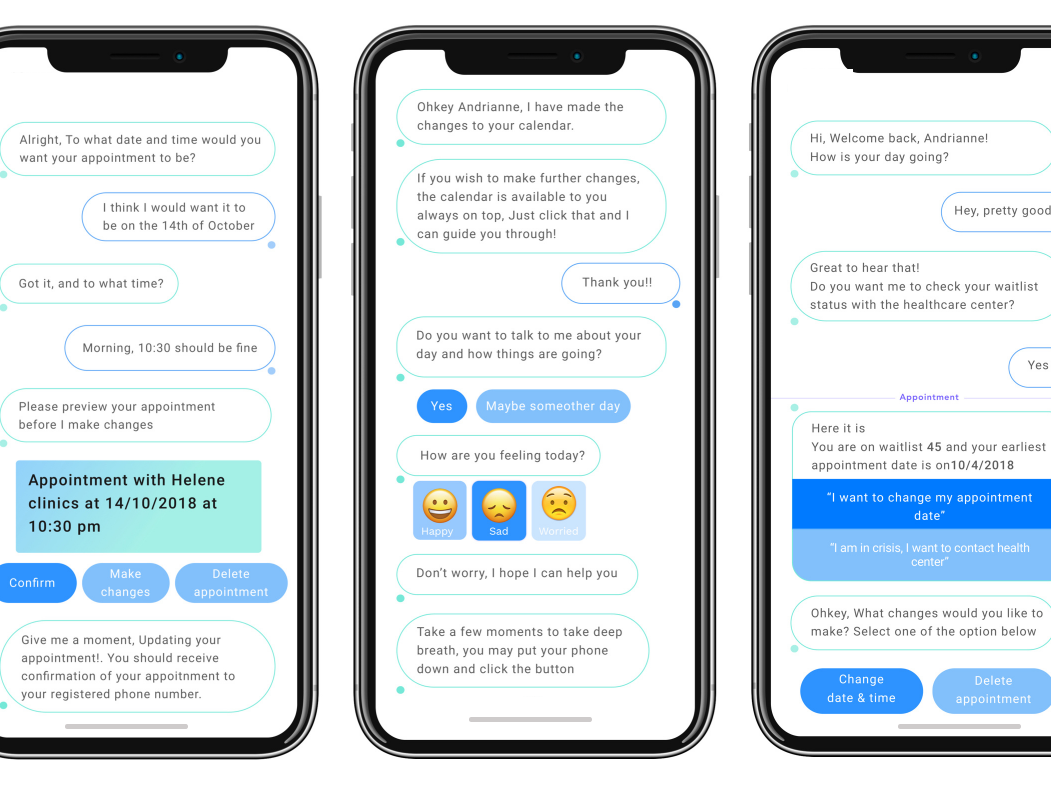

Technology has gotten good at identifying and labeling emotions fairly accurately, based on motion and facial expressions, a person's online activity, phrasing and vocal tone, says Rosalind Picard, director of MIT's Affective Computing Research Group. "It's not a person, but, it makes you feel like it's a person," she says, "because it's asking you all the right questions." Ali says things the chatbot said reminded her of the in-person therapy she did years earlier. The chatbot would then suggest things that might soothe her, or take her mind off the pain - like deep breathing, listening to calming music, or trying a simple exercise she could do in bed. "I'm not feeling it," Ali says she sometimes would respond. "How are you feeling today?" the chatbot would ask. Confined to her bed, she could text it at 3 a.m. "I'm like, 'OK, I'm talking to a bot, it's not gonna do nothing I want to talk to a therapist," Ali says, then adds, as if she still cannot believe it herself: "But that bot helped!"Īt a practical level, she says, the chatbot was extremely easy and accessible. Many people will not embrace opening up to a robot.Ĭhukurah Ali says it felt silly to her too, initially.

"Woebot listens to the user's inputs in the moment through text-based messaging to understand if they want to work on a particular problem," Robinson says, then offers a variety of tools to choose from, based on methods scientifically proven to be effective. It's best thought of as a "guided self-help ally," says Athena Robinson, chief clinical officer for Woebot Health, an AI-driven chatbot service. Proponents call the chatbot a 'guided self-help ally' Or apps that encourage forms of journaling might boost a user's confidence by pointing when out where they make progress. Someone dealing with stress in a family relationship, for example, might benefit from a reminder to meditate. "My worry is they will turn away from other mental health interventions saying, 'Oh well, I already tried this and it didn't work,' " she says.īut proponents of chatbot therapy say the approach may also be the only realistic and affordable way to address a gaping worldwide need for more mental health care, at a time when there are simply not enough professionals to help all the people who could benefit. Tekin says there's a risk that teenagers, for example, might attempt AI-driven therapy, find it lacking, then refuse the real thing with a human being. Algorithms are still not at a point where they can mimic the complexities of human emotion, let alone emulate empathetic care, she says. "The hype and promise is way ahead of the research that shows its effectiveness," says Serife Tekin, a philosophy professor and researcher in mental health ethics at the University of Texas San Antonio. Serife Tekin, mental health researcher, University of Texas San Antonio. My worry is will turn away from other mental health interventions, saying, 'Oh well, I already tried this and it didn't work.' It's an area garnering lots of interest, in part because of its potential to overcome the common kinds of financial and logistical barriers to care, such as those Ali faced. Human emotions are tracked, analyzed and responded to, using machine learning that tries to monitor a patient's mood, or mimic a human therapist's interactions with a patient. Advances in artificial intelligence - such as Chat GPT - are increasingly being looked to as a way to help screen for, or support, people who dealing with isolation, or mild depression or anxiety. That is how Ali found herself on a new frontier of technology and mental health. The chatbot, which Wysa co-founder Ramakant Vempati describes as a "friendly" and "empathetic" tool, asks questions like, "How are you feeling?" or "What's bothering you?" The computer then analyzes the words and phrases in the answers to deliver supportive messages, or advice about managing chronic pain, for example, or grief - all served up from a database of responses that have been prewritten by a psychologist trained in cognitive behavioral therapy. Its chatbot-only service is free, though it also offers teletherapy services with a human for a fee ranging from $15 to $30 a week that fee is sometimes covered by insurance. So her orthopedist suggested a mental-health app called Wysa. She had no health insurance, after having to shut down her bakery. As darkness and depression engulfed Ali, help seemed out of reach she couldn't find an available therapist, nor could she get there without a car, or pay for it.


 0 kommentar(er)
0 kommentar(er)
